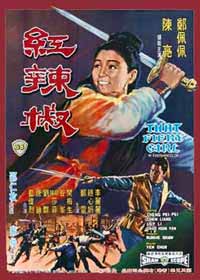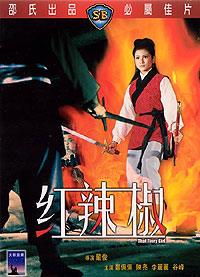 Pearl is a bandit king's daughter. She is known known by the sobriquets "The Red Chili" & That Fiery Girl (Hong la jiao, 1968). She rides into the story already considering herself a leader of the tough men who accompany her.
Pearl is a bandit king's daughter. She is known known by the sobriquets "The Red Chili" & That Fiery Girl (Hong la jiao, 1968). She rides into the story already considering herself a leader of the tough men who accompany her.
Yet when they begin to harrass & kill innocent people, they pay small attention when she tries to restrain them. Strangely Pearl takes a "boys will be boys" attitude, whatever it takes to never see the vicious corruption her father oversees.
As played by the phenomenal action star & beauty Cheng Pei-pei, Red Chili is a naive girl convinced her father (Han Long Fen) is chivalrous as bandits go. Her father's followers are constitutionally incapable of keeping up the charade for her sake, but she remains pretty easy to fool.
Eventually she'll have to overcome her blindspot & admit she has an evil dad. How can her own chivalrous feelings ever be harmonized with her filial piety? Chances are there's never going to be a way.
Young swordsman Mei Feng-chun (Chen Liang) returns to his village with two companions of the Mei clan, tragically to find family members slain. The bandits of Hulu Valley have thereby become his mortal enemies. There's also a Mei clansman who betrayed the family in order to lay hands on a treasure map. Feng-chun will devote all his martial abilities to avenging the Mei clan of these sundry villains.
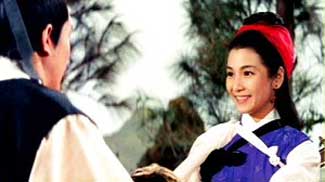 Pearl the Red Chili is fiery indeed, & capable of considerable ferocity, therefore feared by all. Pearl the Red Chili is fiery indeed, & capable of considerable ferocity, therefore feared by all.
That outsiders consider her to be a very bad sort doesn't bother her. They say the same things of his father, & oh what a chivalrous son of a gun she regards him as being.
She is generally to be found at the main border station of Hulu Valley where she operates a teahouse/inn, but has the actual task of keeping outsiders from gaining access to the bandit village within the valley, by means of her rapid two-edged sword if it comes to that.
Her usual residence being outside the center of the bandits' town partially explains why she knows so little of her father's actual behavior patterns, though really only self-deception permits her to believe there is anything noble about her criminal clan.
The young swordsman Mei Feng-chun & his two companions kill the family betrayer from whom they learnt the secret slogans by which safe entry to the valley might be permitted, without interference from Red Chili.
Gaining access to the valley is only the beginning, since Feng-chun must pass through natural boundaries & artificial traps to reach the hidden village of the bandid king. Pearl assists him in the passage, having taken a preliminary fancy to him.
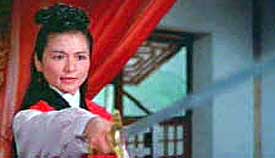 Xiao Hua (Lily Li) enters the picture as a romantic rival. It becomes obvious that Pearl & Feng-chun have fallen for one another, but there are conspirators in support of a scoundrel named Hsieh Kuang (Cheng Lei) who has long desired Pearl.
Xiao Hua (Lily Li) enters the picture as a romantic rival. It becomes obvious that Pearl & Feng-chun have fallen for one another, but there are conspirators in support of a scoundrel named Hsieh Kuang (Cheng Lei) who has long desired Pearl.
He attempts to cause Feng-chun to be unable to evade marriage with Xiao Hua. This role doesn't give Lily Li a lot to do, as she was still a year away from achieving her own star status at Shaw Brothers.
She's Pearl's "sister" both in the martial world sense & for having been nursed by the same woman (the great character actress Ou-yang Shafei) when they were babies, though they are not blood sisters. They both call the old woman momma, she that keeps secrets that will shatter Pearl's world & her sense of her place within it.
Director Yen Chun was not ordinarily a wuxia director so develops much of the film as a costume romance, with only the final reel totally turned over to action directors.
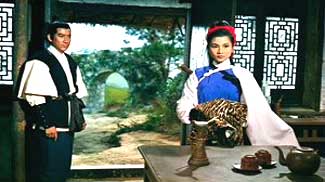 The finale is certainly action enough, & it's actually nice to see a bit more of a film devoted to character interactions other than barely rationalized efforts to kill each other. The finale is certainly action enough, & it's actually nice to see a bit more of a film devoted to character interactions other than barely rationalized efforts to kill each other.
When Pearl & Xiao Hua's mother figures out the infiltrating swordsman is of the Mei clan, she begins to help him immediately, she being secretly a member of the Mei clan long ago carried away by the bandits. And it's just about time Pearl learned her own origin.
The marriage rivalry results in Pearl as Feng-chun's marriage choice, which permits Cheng Pei-pei to dress in the epitome of medieval femininity, a bride, or an opera-costume exaggeration of a beautiful bride. This will also result in her having one of her fight scenes in a resplendant opera costume.
Choreography is only average but great to watch even so. Pei-pei learns that her father isn't her real father, but that he massacred her entire family & stole her as a baby.
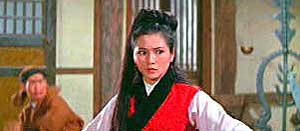 Our hero Feng-chun has secretly been drawing a map of the way in & out of Hulu Valley. Our hero Feng-chun has secretly been drawing a map of the way in & out of Hulu Valley.
The map must be gotten to government soldiers who'll end the bandit clan's reign of terror, while at the same time Pearl the Red Chili has changed sides for the pending battle, eager to avenge her real parents.
As always, the climax will resolve everything almost too easily with violence, with but a few complications to sustain broader interest. For me, the primary attention-holder was Cheng Pei-pei rampaging against the bandits, dueling her former evil suitor, proving herself at every turn indeed That Fiery Girl.
Her duel with her foster-father is emotionally bizarre, blood obviously counting for more than actions in her mind, as she'd refashioned him a perfectly fine daddy until that day but now seems to retain very little sentiment about his foster parenting.
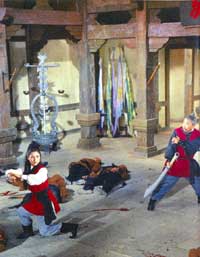 The sword battle has some fine bits worked into the choreography, for the psychological context is bizarre enough to give it power. And when her foster father yells, "Ungrateful girl!" one can't help but agree with him just a little, not enough to be sorry for him at all. The sword battle has some fine bits worked into the choreography, for the psychological context is bizarre enough to give it power. And when her foster father yells, "Ungrateful girl!" one can't help but agree with him just a little, not enough to be sorry for him at all.
She had overlooked his villainy when she thought they were related, but now, he's a doomed bad guy, though no pushover even at that, peevish that he spared the life of a sweet baby who has come of age only to do this.
That she doesn't just kill him outright is the one concession to his years raising her; she'll leave his ultimate fate to the law, unlike in most such films that rely on vigilantism.
I hugely enjoyed That Fiery Girl. Even though it's not one of Cheng Pei-pei's finest outings, it's certainly worthy of her beauty & talent.
Continue to next Cheng Pei Pei film:
Whiplash, 1974
copyright © by Paghat the Ratgirl
|
